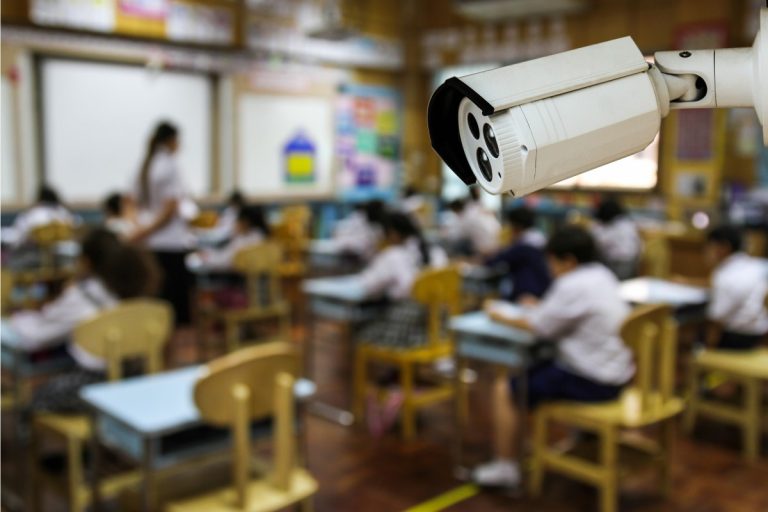
To ease growing fears over student safety in schools, parents in the Indian capital of New Delhi will soon be able to watch their children throughout the school day on their phones.
The change is part of fresh security measures put in place by the state following several recent cases of violence – one involving the death of a seven-year-old and another, the rape of a five-year-old girl.
In response to the incidents, Delhi’s Chief Minister Arvind Kejriwa announced that live CCTV cameras would be installed in schools so that parents could check up on their children at any time of the day.
The cameras are expected to be operational within three months.
In September 2017, seven-year-old Pradyuman was reportedly found dead with his throat slit inside his school bathroom at the Ryan International school in Gurugram, near New Delhi, according to Sputnik News. Several days later, a five-year-old girl was reportedly raped in a school just east of the capital.
Another incident took place last week in the neighbouring state of Uttar Pradesh. Another seven-year-old student was allegedly found stabbed and bleeding inside a school.
According to Sputnik News, the boy told authorities a senior student took him into the bathroom, thrashed him, and then stabbed him with a knife. He is now said to be in critical condition.
“This will make the whole system transparent and accountable. It will ensure safety of kids,” Arvind tweeted on the CCTV plan.
Reviewed the progress of installation of CCTV cameras in each class in all govt schools. Each parent will be given access to see his child studying in class on realtime basis on his phone. This will make the whole system transparent and accountable. It will ensure safety of kids
— Arvind Kejriwal (@ArvindKejriwal) January 17, 2018
Delhi’s Rural Development Minister Gopal Rai said the system is a revolutionary step for the safety and security of children.
“It’s a great initiative of the Delhi government. It will help in improving studies through transparency and accountability as parents can watch their children as well as the teachers,” Gopal Rai told the publication.
“Further, it will strengthen safety and security of the students which is now a core concern for parents especially after the Ryan School incident. In fact, Delhi government schools could become a model which other state government schools can replicate.”
Some parents in India have welcomed the announcement.
Uma Thakur, whose daughter is five told The Guardian: “It’s a good thing. We have to know what our children are doing there all day. There are rape cases, murders. These things are happening in schools everywhere. Every parent is worried.”
However, the initiative has also sparked concerns for the privacy of school children and teachers, with some suggesting it to be the beginning of a dystopian future for India.
CCTVs in classrooms is a great step but real time surveillance is a dystopian nightmare!
Every child deserves right to privacy. Please really reconsider this move. Constant fear in children will hamper their development.
Watch S4E2 of Black Mirror show @ArvindKejriwal https://t.co/JWQgYk2crW
— Dhruv Rathee (@dhruv_rathee) January 17, 2018
Meeta Rai, the principal of Delhi Public School, Indirapuram, told The Wire: “In my school, we have over 300 CCTV cameras but not one in a classroom. We do not want teachers to be burdened while teaching. Constant monitoring can turn them into nervous wrecks.”
She thinks that monitoring students can be beneficial but there is no need for the teachers to ever be recorded.
“If the cameras are installed strategically, from the reactions of children you can still know how a class is being conducted,” she said.
The live streaming of classrooms has been implemented elsewhere in Asia, including in China. This move was brought in to encourage better behaviour among students, as students feared their parents could be watching them.
Officials were criticised, however, for allowing the live streaming of classrooms in China over fears that constant paranoia might psychologically affect students.
I tried to summarise arguments against CCTV in schools:
1. Impinges on child’s right to privacy
2. Feeling of surveillance not good for development
3. Recording will leak, esp naughtiness, risk of shaming
4. Parents can watch other kids. Why?Anything else? Will escalate.
— Arvind Jha (@jalajboy) January 18, 2018
Although the justification for operating CCTV in schools in India is for the safety of children rather than to instil fear, some have suggested that the psychological effect may be equally as damaging.
A lawyer, identifying himself as Apar, stated that “a real-time video tracker in schools will lead to policing of children not only to prevent crimes but their moral choices and behaviour. Eg. social interactions (“stay away from X kid”). It will condition children into fearful clients not full individuals,” reported The Wire.
Liked this? Then you’ll love…
1 in 4 teenagers in rural India can’t read their own language







